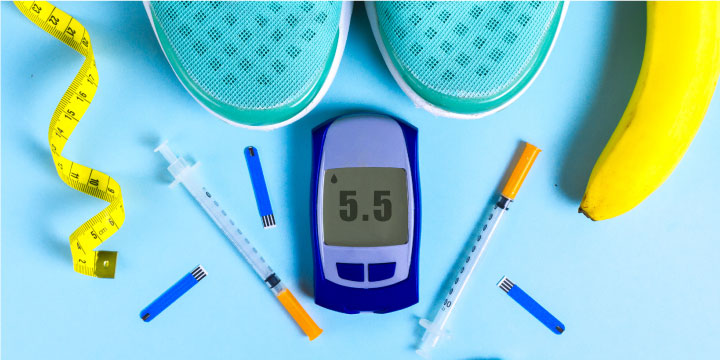5 Facts About Diabetes and Your Vision
23-05-2024
Diabetes is a chronic condition that affects millions of people worldwide. While it's commonly known for its impact on blood sugar levels, diabetes can also have significant effects on your vision. Here are five important facts about diabetes and your vision:
1. Diabetic Retinopathy is a Leading Cause of Vision Loss
Diabetic retinopathy occurs when high blood sugar levels damage the blood vessels in the retina, the light-sensitive tissue at the back of your eye. This condition can lead to vision impairment and even blindness if not managed properly. Early detection through regular eye exams is crucial for preventing severe outcomes.2. High Blood Sugar Levels Can Cause Blurry Vision
Fluctuating blood sugar levels can lead to temporary changes in vision, such as blurriness. This occurs because high blood sugar can cause the lens of the eye to swell, altering your ability to see clearly. Maintaining stable blood sugar levels through proper management of your diabetes can help prevent these vision changes.3. Cataracts Develop More Rapidly in People with Diabetes
Cataracts, a condition where the lens of the eye becomes cloudy, tend to develop at an earlier age and progress more rapidly in individuals with diabetes. This can cause vision to become blurry or hazy, making it difficult to see. Surgery to replace the cloudy lens with a clear artificial lens is an effective treatment for cataracts.4. Diabetes Increases the Risk of Glaucoma
People with diabetes are at a higher risk of developing glaucoma, a group of eye conditions that damage the optic nerve, often due to increased pressure in the eye. Glaucoma can lead to vision loss if not treated. Regular eye exams can help detect glaucoma early, allowing for timely treatment to prevent significant vision impairment.5. Dry Eyes Are Common in Diabetes
Many people with diabetes experience dry eyes and develop Dry Eye Syndromedue to reduced tear production or poor tear quality. This can cause discomfort, blurred vision, and an increased risk of eye infections. Using artificial tears and managing blood sugar levels can help alleviate dry eye symptoms.Regular Eye Exams are Essential
For individuals with diabetes, annual comprehensive eye exams and diabetic eye exams are essential. Annual exams help detect early signs of diabetic retinopathy and other eye conditions related to diabetes, such as cataracts and glaucoma. Once diagnosed, annual comprehensive eye exams and diabetic health exams, staggered 6 months apart, can prevent or slow down the progression of these conditions, preserving your vision. Schedule An Appointment
Adult Eye Exams
Our advanced eye exams consist of 25+ modern tests and digital scans to assess eye health, function, and visual acuity.

Child Eye Exams
Give your child a clear future with an annual eye exam from our experienced Edmonton optometrists.

Senior Eye Exams
Maintain your vision through your golden years with gold standard eye care from the optometrists at our Edmonton eye clinic.

Contact Lens Eye Exams
Our eye exams for contact lens wearers include test and digital scans to assess eye health, function, visual acuity, and lens fit.

Diabetic Eye Exams
Managing diabetes requires regular eye exams to ensure that diabetes is not causing irreversible vision loss.

Dilated Eye Exams
Dilating the eyes enables our Edmonton optometrists to see more of the eye so that you many never see less.
Our Edmonton Eye Exams Are Comprised Of 4 Phases Of Evaluation

1. Eye Exam Pre-Testing
Corneal Thickness | Intraocular Pressures | Visual Field
Pre-testing is a detailed process that gathers all necessary information for the optometrist in advance of the optometrist-administered eye examination. This process involves completing a detailed patient history, as well as a series of standard tests. Pre-testing is an essential part of the comprehensive eye exam process, providing valuable information and visuals for both the optometrist and the patient.
More About Pre-Testing »
2. Advanced Diagnostic Testing
Retinal Photography, OCT, Topography
eye-deology Vision Care differentiates itself from other clinics by having the most advanced modern diagnostic specialty testing equipment. Specialty equipment, such as a wide-angle high-resolution retinal imager, Optical Coherence Tomography (OCT), Humphrey Visual Field Analyzer and corneal topographer, ensures that patients receive the best comprehensive eye care.
More About Advanced Testing »
3. Optometrist Examination
Health Assessment & Disease Diagnosis
eye-deology Vision Care Edmonton optometrists perform a multitude of tests and assessments to evaluate ocular health, eye coordination, and visual acuity. In addition, they also evaluate the results of the tests and scans performed during pre-testing. As part of patient education, our optometrists also take the time to show and explain results to patients.
More About Doctor Exam »
4. Eye Glass Consult
Prescription | Lens Selection | Digital Fitting
If you require corrective lenses to improve your vision, our licensed opticians will customize their fit to your unique attributes, needs, lifestyle, and budget. Our opticians are happy to provide you with information about the latest eyeglass frame and lens technologies available so you can make informed decisions and begin seeing and looking your best.
More About Eyewear Consult »